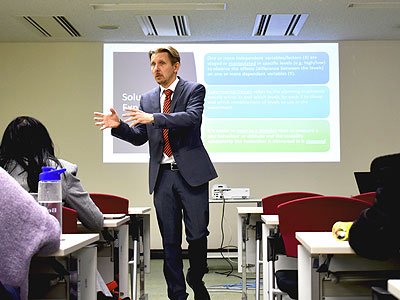- HOME
- NOTICES
- Seminar Report: “A Stated Choice Analysis of Corporate Rebranding, Foreign Takeover and Production Relocation Abroad”
Seminar Report: “A Stated Choice Analysis of Corporate Rebranding, Foreign Takeover and Production Relocation Abroad”
On Monday, January 21, the “RCAPS Current Research Seminar” entitled “A Stated Choice Analysis of Corporate Rebranding, Foreign Takeover and Production Relocation Abroad” was delivered by Professor Rian Beise-Zee of APU-APM.[Report by Professor Rian Beise-Zee]
This RCAPS Current Research Seminar focused on common methodological problems of research and presented a solution. The purpose was to challenge APU undergraduate students, graduate students, and faculty members to rethink the common empirical method of measuring model constructs by asking respondents in a survey to rate each construct on a scale. After a broad critique of using rating scales for construct respondents normally not quantified in their day-to-day decision making, another inherent problem of the survey methodology denoted as “common method bias” was introduced. The common method bias arises when a respondent is asked to rate both independent and dependent variables in close succession in a survey. This leads to a bias towards confirming the cause hypothesis, since respondents look for consistency in their answers. Dr. Beise-Zee showed how both problems can be tackled by using an experiment as a main approach to surveying as well as letting respondents pick a favored alternative in a series of choice sets. The resulting research approach is called “Stated Choice Analysis”. The approach was then explained in greater detail.
In the second part of the lecturer an example for a stated choice experiment was given. The example demonstrated the flexibility and adaptability of the method to many research areas, e.g. marketing, public health care, environmental studies and public choice. In the example, respondents are asked to repetitively choose a car from a set of three cars. The cars only differ by the ownership of the company, the location of manufacturing and the brand name. Everything else about the cars were the same. This approach identifies how much respondents value or are willing to pay more for a product produced by a Japanese company compared to a Chinese company, a production location in Japan compared to manufacturing in China and an established brand compared to a rebranded product. As a result of this study, the broad preference system could provide an estimation that reflects the impact corporate decisions have on the attitudes of the society in Japan. In particular it was demonstrated that decisions on such factors as relocation of production abroad, rebranding and selling the majority of a Japanese company to a Chinese company lead to a substantial drop in the price premium of a car. Furthermore, the study also suggested that interaction effects exist between these corporate decisions, that is, that the impact of corporate decisions is not additive.


- TOPIC
- セミナー

